 October 2023 in “Facial Plastic Surgery”
October 2023 in “Facial Plastic Surgery” Local anesthesia with a "ring block" is preferred for pain control during FUE hair transplant procedures.
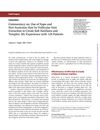 1 citations,
September 2015 in “Aesthetic Surgery Journal”
1 citations,
September 2015 in “Aesthetic Surgery Journal” Dr. Umar successfully used softer hair from the nape and around the ear for natural-looking hairlines in 128 patients, with some concerns about hair loss over time.
 May 2022 in “Hair transplant forum international”
May 2022 in “Hair transplant forum international” The document concludes that following a specific 15-step process can improve the success of hair transplant extractions.
 October 2021 in “Indian Journal of Plastic Surgery”
October 2021 in “Indian Journal of Plastic Surgery” Hair transplant techniques have improved and become less invasive over time, but there are concerns about unregulated centers. The market is growing, with potential for more growth in India due to increasing hair loss cases. New technologies like robotic transplants are promising for the future. Surgeons are encouraged to prioritize patient safety and understand the science behind their techniques.
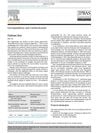 January 2017 in “Journal of Plastic Reconstructive and Aesthetic Surgery”
January 2017 in “Journal of Plastic Reconstructive and Aesthetic Surgery” The authors suggest using scalp hair follicles for beard reconstruction to improve results and reduce surgery time and patient discomfort.
 October 2023 in “Facial Plastic Surgery”
October 2023 in “Facial Plastic Surgery” Beard hair is the best for body hair transplants, but the procedure is complex and requires experienced professionals.
 4 citations,
October 2021 in “Indian Journal of Plastic Surgery”
4 citations,
October 2021 in “Indian Journal of Plastic Surgery” Beard and moustache reconstruction can improve facial hair appearance with few side effects.
 October 2023 in “Facial Plastic Surgery”
October 2023 in “Facial Plastic Surgery” The document concludes that hair transplant practices, especially Follicular Unit Excision, are continually improving with refined techniques and tools for better results.
 1 citations,
May 2021 in “Hair transplant forum international”
1 citations,
May 2021 in “Hair transplant forum international” Using hair grafts from outside the safe zone requires careful placement to improve their survival and effectiveness.
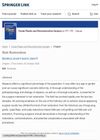 October 2020 in “Springer eBooks”
October 2020 in “Springer eBooks” Hair restoration has evolved to use follicular units for more natural results, moving away from older methods like large plug grafts and scalp reductions.
 January 2021 in “Hair transplant forum international”
January 2021 in “Hair transplant forum international” The T-Fast multi-implanter makes hair transplant surgeries quicker and cheaper.
 11 citations,
August 2020 in “Dermatologic Surgery”
11 citations,
August 2020 in “Dermatologic Surgery” Different hair transplant tools work best in different situations; surgeons should know their tools and patient differences to improve results.
 9 citations,
May 2020 in “Journal of Cosmetic Dermatology”
9 citations,
May 2020 in “Journal of Cosmetic Dermatology” Hair restoration surgeons have improved follicular unit excision (hair transplant method) by using innovative tools and techniques, reducing hair damage and increasing success rates.
 3 citations,
June 2020 in “Dermatologic Surgery”
3 citations,
June 2020 in “Dermatologic Surgery” Dense-packing follicular unit extraction is a safe and effective way to treat extensive scarring alopecia.
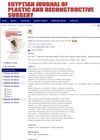 April 2020 in “The Egyptian Journal of Plastic and Reconstructive Surgery”
April 2020 in “The Egyptian Journal of Plastic and Reconstructive Surgery” Both follicular unit extraction and scalp expanders effectively treat secondary cicatricial alopecia, with scalp expanders leading to quicker and denser hair growth.

The robotic system for hair restoration surgery works well, giving similar results to manual techniques after 9 months.
 3 citations,
October 2021 in “Indian Journal of Plastic Surgery”
3 citations,
October 2021 in “Indian Journal of Plastic Surgery” Follicular unit extraction is a hair transplant method that can leave small scars and uses various tools for harvesting hair from different body parts.
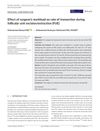 6 citations,
July 2019 in “Journal of Cosmetic Dermatology”
6 citations,
July 2019 in “Journal of Cosmetic Dermatology” Surgeons make more mistakes in hair transplant procedures as they get tired or do more work.
 September 2021 in “PubMed”
September 2021 in “PubMed” Hair transplantation is effective for treating scar-related hair loss on the head and neck.
 1 citations,
April 2019 in “Aesthetic Plastic Surgery”
1 citations,
April 2019 in “Aesthetic Plastic Surgery” Secondary hairline correction surgery can be effective and satisfying when customized to the patient's needs.
 3 citations,
March 2019 in “Archives of Plastic Surgery”
3 citations,
March 2019 in “Archives of Plastic Surgery” Hair transplantation effectively corrects hairline issues after midface-lifting surgery with high patient and physician satisfaction.
 January 2019 in “Hair transplant forum international”
January 2019 in “Hair transplant forum international” Clean and sterile gloves showed no difference in scalp contamination during hair transplant surgery.
 January 2019 in “Hair transplant forum international”
January 2019 in “Hair transplant forum international” FUE is recommended as the initial choice for hair transplant on skin grafts.
 6 citations,
January 2019 in “Journal of Cutaneous and Aesthetic Surgery”
6 citations,
January 2019 in “Journal of Cutaneous and Aesthetic Surgery” Follicular unit extraction is an effective hair transplant method for advanced baldness with high patient satisfaction, but some experienced decreased density over time.
 12 citations,
February 2007 in “Facial Plastic Surgery”
12 citations,
February 2007 in “Facial Plastic Surgery” Hair transplantation techniques have improved over 12 years, with follicular unit grafting providing more natural results and potential future advances in automation and genetics.
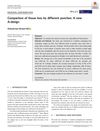 4 citations,
June 2018 in “Journal of Cosmetic Dermatology”
4 citations,
June 2018 in “Journal of Cosmetic Dermatology” The new A-design punch for hair restoration surgery may lead to smaller scars compared to other types.
 2 citations,
April 2018 in “Journal of Cosmetic Dermatology”
2 citations,
April 2018 in “Journal of Cosmetic Dermatology” Tumescent fluid increases scalp hair angles, which may improve hair transplant results and reduce surgeon fatigue.
 January 2018 in “Journal of Cosmetics, Dermatological Sciences and Applications”
January 2018 in “Journal of Cosmetics, Dermatological Sciences and Applications” Hair transplant surgery can successfully treat hair loss at the back of the neck.
 6 citations,
March 2018 in “Hair transplant forum international”
6 citations,
March 2018 in “Hair transplant forum international” The Graft Quality Index grades hair transplant grafts to predict placement difficulty and surgery results.
 7 citations,
November 2017 in “Plastic and reconstructive surgery. Global open”
7 citations,
November 2017 in “Plastic and reconstructive surgery. Global open” FUE and SMP together can effectively treat hair loss, needing fewer procedures.






























